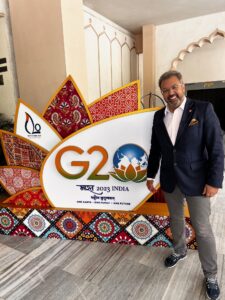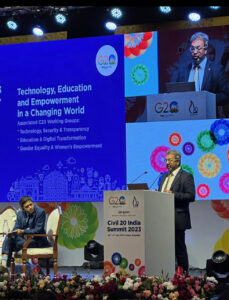Nik Gugger on political responsibility, cultural misunderstandings – and how he became a key figure in the agreement
Niklaus-Samuel “Nik” Gugger is a Swiss National Councilor and social entrepreneur with Indian roots. In this interview, he discusses his role as the “unofficial ambassador of Switzerland” in the free trade agreement with India, cultural pitfalls in international negotiations, and an AI-based tool that prepares European decision-makers for Indian business culture.
1. Mr. Gugger, you are a politician, entrepreneur, author – and until recently also a restaurateur. What drives you?

I draw my energy from an inner conviction: that humans are more than performance. My faith plays a central role – not as dogma, but as a source of confidence and clarity. For me, spirituality is not a ritual but a mindset in everyday life.
And: I love working with people. Interactions at eye level energize me. I don’t ask, “Why can’t this work?” but “How could it work?” This entrepreneurial mindset carries me through many roles – from National Councilor to cultural networker.
2. You were born in India, live in Switzerland, and have been building bridges between the two countries for years. How does your biography shape your political engagement?
I was born in South India and adopted as a young child into Switzerland. This dual identity is not a contradiction for me, but a gift: I understand both worlds – not only rationally but emotionally.
At a time when cultural misunderstandings can often derail entire negotiations, I see it as my role to mediate. Politics, business, and culture cannot be separated – they are interconnected.
3. India’s Trade Minister Piyush Goyal called you the “unofficial ambassador of Switzerland.” What does that mean to you?
It was a great honor – less for the title, more for the recognition of the behind-the-scenes work. In international relations, it’s not just about contracts, but trust.
For me, being an “ambassador” means listening, interpreting, and building relationships. That Minister Goyal said this publicly shows how important cultural empathy is in diplomacy – often more than protocol and legal texts.
4. What was your concrete role in the free trade agreement – beyond official mandates?
I was never formally part of the delegation, but often in the room – as a mediator, a “cultural translator.” For example, in London, during intense negotiation rounds, I paid attention to who actually had influence – beyond official titles. In one case, I identified a quiet but central figure – a kind of “grey eminence” – and shared this insight with the Swiss team.
Such insights only arise when you understand both cultures and can read between the lines. I helped where official channels couldn’t.
5. After more than 16 years, the free trade agreement was finally signed. Why did it succeed now?
Because the right people took responsibility at the right time. In Switzerland, Federal Councillor Parmelin and State Secretary Helene Budliger led the dossier not only technically but politically. In India, Minister Goyal recognized that strategic partnerships strengthen India globally.
Additionally: Many young Indian decision-makers have studied in the West and bring intercultural competence. And: For the first time, the EFTA states commit to concrete investments – over $100 billion, aiming to create one million jobs in India. This is more than trade – it’s geopolitical cooperation.
6. What are your key lessons from the long negotiation process?

India demands respect, not instruction. Many Europeans – often unconsciously – come across with superiority: efficiency-driven, rule-oriented, distant. Yet in India, relationships matter more than any contract detail.
Negotiations require patience. Trust arises through continuity, not haste. Those who think Western directness will speed things up often achieve the opposite.
7. What three recommendations would you give European entrepreneurs for success in India?
Succeeding in India requires more than a business plan. Three principles are key:
Darshan – being seen: In India, trust means being personally present. Not just as a business partner, but as a human. A real conversation, a shared story – weighs more than any PowerPoint or pitch deck.
Jugaad – creative flexibility: Indian partners think in solutions, not rigid processes. Those who insist on rules often fail. Being pragmatic often yields surprisingly innovative results.
Vulnerability – trust arises through risk: Those willing to invest not only financially but also personally are often rewarded. In India, emotional intelligence and willingness to take risks matter more than spreadsheets.
8. You developed an AI-supported negotiation coach for the Indian context with Prof. Dr. Roger Moser. Why?
Because I repeatedly experienced the same misunderstandings – on both sides. Europeans often interpret Indian reserve as opacity; Indians often see European directness as disrespectful.
So we developed a tool that prepares European decision-makers for real conversations with Indian partners – culturally, emotionally, strategically. This is complemented by a guide to cultural navigation. The goal is not to “optimize” India, but to understand it.
Understand India. Negotiate successfully. Start now.
Negotiating in India is the first AU-supported negotiation coach specifically for European decision-makers – developed by Nik Gugger and Prof. Dr. Roger Moser. The tool is complemented by a training & coaching program that builds cultural competence and enables negotiations at eye level. More in the LinkedIn newsletter GANESHA – with critical reflections, practical insights, and analyses on Swiss–Indian collaboration.
Planning market entry in India?
Access to the Indian market is easier than ever.
The Switzerland–India free trade agreement has been signed – and the EU also plans to finalize an agreement with India in 2025.
Project Professionals AG and Kloepfel Services support feasibility studies, plant construction, and building robust supply chains – with intercultural competence and operational on-site experience.
Avoid costly missteps and gain an advantage while others hesitate. See the case study: “Establishing a Plant for Cleaning Machines in India.”
- More about Project Professionals AG: https://project-professionals.net/
- More about Kloepfel Services: https://www.kloepfel-services.com/
Contact:
Kloepfel Group
Damir Berberovic
Tel.: +49 211 941 984 33 | Email: rendite@kloepfel-consulting.com
